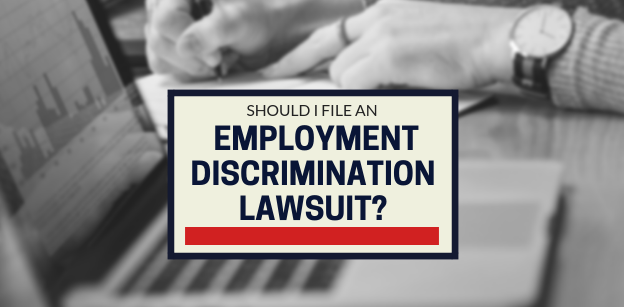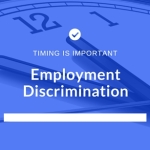There are countless criteria that should be considered before filing an employment discrimination lawsuit against your current or former employer. And before making that decision, it is certainly recommended that you speak with an employment lawyer near you. However, some of the issues that you should evaluate prior to making that decision include the following:
- Have you filed a charge of discrimination with the Texas Workforce Commission or Equal Employment Opportunity Commission (EEOC)?
- Do you have a Right to Sue from the Texas Workforce Commission or Equal Employment Opportunity Commission (EEOC)?
- What evidence do you have to support your employment discrimination claim?
- Do you have any witnesses?
- Do you have documentation?
- Do you have audio/video recordings?
- What are your potential damages?
- Can you afford to pursue litigation?
Before filing an employment discrimination lawsuit
Unlike some areas of law that allow individuals to file a lawsuit immediately (e.g. personal injury arising out of an auto accident), an employee who is claiming employment discrimination must first file a charge of discrimination with the Texas Workforce Commission and/or Equal Employment Opportunity Commission (EEOC). This is a prerequisite for filing a lawsuit in state or federal court. Once the charge of discrimination is filed, an investigation will be conducted for a period typically between 6 months and a year before you are issued a Right to Sue. Once the Right to Sue is received, you will have either 60 days (if it is received from the Texas Workforce Commission) or 90 days (if it is received from the EEOC) to file a lawsuit in state or federal court, respectively.
Do I have enough evidence to prove employment discrimination?
Because each and every case is so very different, it is impossible to lay out what evidence is, and is not, sufficient to prove employment discrimination. However, the more evidence of discrimination that you have, the easier it is going to be to prove. The types of evidence that will likely be most helpful are documentary evidence (e.g. emails, memos, notes, etc.), audio/video recordings, and witnesses. You want to evaluate all of your evidence to determine the strengths and weaknesses of your claim(s) before filing suit.
How much is my case worth?
The value of any case is determined based on the specific facts of the claim(s). A significant portion of the damages in an employment discrimination lawsuit is based on the length of employment and income pre and post-termination. Additionally, you can recover emotional distress/mental anguish damages based on the severity of the discriminatory conduct. There are also certain statutory caps on the maximum amount of damages that can be recovered.
How much does an employment discrimination lawsuit cost?
Once again, every case is different, and that includes how much money it costs to successfully pursue an employment discrimination lawsuit. At the very least, you are looking at a filing fee and service of the lawsuit, which is generally in the range of $400-500. After that, the majority of your costs will be in depositions (paying a court reporter and potentially a videographer) and expert witnesses. Deposition costs will typically run between $750-2,000 per deposition but can exceed that if travel is involved. It may be helpful to have an expert witness involved in your case to testify about the financial losses or emotional distress you have suffered as a result of the discriminatory termination. Expert witness fees can vary wildly, but you are generally looking at spending several thousand dollars to retain one. Prior to filing suit, you must determine if the cost of potential litigation is something that you can afford.
At the end of the day, it is always good advice to speak with an employment attorney about your potential claim(s) before deciding to file an employment discrimination lawsuit. Not only is it smart to have an outside opinion, but an employment attorney will be better versed in the current state of the law and which court, if any, is best to file in. Ultimately, you may choose to get multiple consultations from attorneys before determining (a) if you should file an employment discrimination lawsuit and (b) which attorney you will retain to represent you in that lawsuit.








